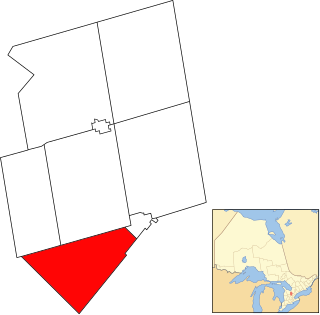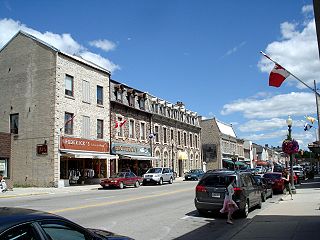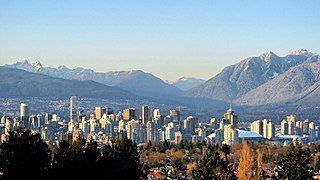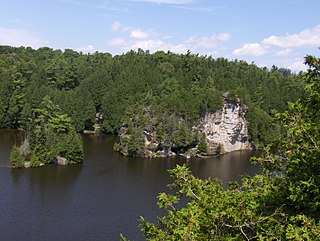Kanadalik O'zbeklar | |
|---|---|
| Total population | |
| 3,920 (by ancestry, 2016 Census ) [1] | |
| Regions with significant populations | |
| Ontario and Quebec | |
| Languages | |
| Canadian English · Canadian French · Uzbek · Tajik · Russian | |
| Religion | |
| Sunni Islam | |
| Related ethnic groups | |
| Other Turkic peoples |
Uzbek Canadians are Canadian citizens of Uzbek descent or persons of Uzbek descent residing in Canada. According to the 2016 Census there were 3,920 Canadians who claimed Uzbek ancestry. [2] There is a small group of Uzbeks in the city of Guelph. There are 150 ethnic Uzbek families from Afghanistan. The Uzbeks of Guelph are mainly coming from cities of Andkhoi and Faryab. [3]

Guelph is a city in Southwestern Ontario, Canada. Known as The Royal City, it is roughly 22 km (14 mi) east of Kitchener and 70 km (43 mi) west of Downtown Toronto, at the intersection of Highway 6, Highway 7 and Wellington County Road 124. It is the seat of Wellington County, but is politically independent of it.

The Greater Toronto Area, commonly referred to as the GTA, includes the City of Toronto and the regional municipalities of Durham, Halton, Peel, and York. In total, the region contains 25 urban, suburban, and rural municipalities. The Greater Toronto Area begins in Burlington in Halton Region to the west, and extends along Lake Ontario past downtown Toronto eastward to Clarington in Durham Region.

The Golden Horseshoe is a secondary region of Southern Ontario, Canada, which lies at the western end of Lake Ontario, with outer boundaries stretching south to Lake Erie and north to Lake Scugog, Lake Simcoe and Georgian Bay of Lake Huron. The region is the most densely populated and industrialized in Canada. Based on the 2021 census, with a population of 7,759,635 people in its core and 9,765,188 in its greater area, the Golden Horseshoe accounts for over 20 percent of the population of Canada and more than 54 percent of Ontario's population. It is part of the Quebec City–Windsor Corridor, itself part of the Great Lakes megalopolis.

Erin is a town in Wellington County, approximately 80 kilometres (50 mi) northwest of Toronto, Ontario, Canada. Erin is bordered by the Town of Caledon, Ontario to the east, the Town of Halton Hills to the south, the Township of Guelph/Eramosa to the west and the Township of East Garafraxa to the north.

East Garafraxa is a rural township located in Dufferin County, Ontario, Canada, to the west of Orangeville and within relative commuting distance of Toronto, Brampton, Guelph, and Kitchener.

Wellington County is a county located in Southwestern Ontario, Canada and is part of the Greater Golden Horseshoe. The county, made up of two towns and five townships, is predominantly rural in nature. However many of the residents in the southern part of the county commute to urban areas such as Guelph, Kitchener, Waterloo, Brampton, Mississauga, Toronto and Hamilton for employment. The northern part of the county is made up of mainly rural farming communities, except for a few larger towns such as Mount Forest and Arthur. According to the 2021 census, the population of the county was 241,026.

Filipino Canadians are Canadians of Filipino descent. Filipino Canadians are the second largest subgroup of the overseas Filipinos, surpassed only by the United States, the Philippines's former colonizer, and one of the fastest-growing groups in Canada.

Greater Vancouver, also known as Metro Vancouver, is the metropolitan area with its major urban centre being the city of Vancouver, British Columbia, Canada. The term "Greater Vancouver" describes an area that is roughly coterminous with the region governed by the Metro Vancouver Regional District (MVRD), though it predates the 1966 creation of the regional district. It is often used to include areas beyond the boundaries of the regional district but does not generally include wilderness and agricultural areas that are included within the MVRD.
Latin American Canadians are Canadians who are descendants of people from countries of Latin America. The majority of Latin American Canadians are multilingual, primarily speaking Spanish, Portuguese, French and English. Most are fluent in one or both of Canada's two official languages, English and French. Spanish and Portuguese are Romance languages and share similarities in morphology and syntax with French.

Guelph/Eramosa is a township located in Wellington County, in midwestern Ontario, Canada. It partly encircles the city of Guelph, surrounding it in a continuous arc from approximately northeast to south-southwest of the city. It is part of the Guelph census metropolitan area.
Afghan Canadians are Canadians with ancestry from Afghanistan. They form the second largest Afghan community in North America after Afghan Americans. Their ethnic origin may come from any of the ethnic groups of Afghanistan, which include Pashtun, Tajik, Uzbek, Hazara, Turkmen, etc. In the Canada 2016 Census about 83,995 Canadians were from Afghanistan.
Welsh Canadians are Canadian citizens of Welsh descent or Wales-born people who reside in Canada.
Egyptian Canadians are Canadian citizens of Egyptian descent, first-generation Egyptian immigrants, or descendants of Egyptians who emigrated to Canada. According to the 2011 Census there were 73,250 Canadian citizens who are from Egypt, having an increase compared to those in the 2006 Census.
Pakistani Canadian refers to the community in Canada of Pakistani heritage or descent. It can also refer to people who hold dual Pakistani and Canadian citizenship. Categorically, Pakistani Canadians comprise a subgroup of South Asian Canadians which is a further subgroup of Asian Canadians.
Slovak Canadians are citizens of Canada who were born in Slovakia or who are of full or partial Slovak ancestry. According to the 2021 Canadian census, there were 68,210 Canadians of full or partial Slovak descent.
Ethiopian Canadians are a hyphenated ethnicity of Canadians who are of full or partial Ethiopian national origin, heritage and/or ancestry, Canadian citizens of Ethiopian descent, or an Ethiopia-born person who resides in Canada. According to the 2016 Canadian Census, 44,065 people reported Ethiopian ancestry.
Eritrean Canadians are a hyphenated ethnicity of Canadians who are of full or partial Eritrean national origin, heritage and/or ancestry, Canadian citizens of Eritrean descent, or an Eritrea-born person who resides in Canada. According to the 2021 Canadian census, 36,290 Canadians reported Eritrean ancestry.
Palestinian Canadians are Canadian citizens of Palestinian descent or Palestine-born people residing in Canada. According to the 2016 Census there were 44,820 Canadians who claimed Palestinian ancestry.
Kazakh Canadians are Canadian citizens of Kazakh descent or persons of Kazakh descent residing in Canada. According to the 2016 Census there were 3,330 Canadians who claimed Kazakh ancestry. An Association of Kazakhs in Canada was established on November 12, 2003, in Toronto, Ontario.
Tajik Canadians are Canadian citizens of Tajik descent. According to the 2011 Census there were 2,400 Canadians who claimed Tajik ancestry. Presently in the province of Quebec there are living around 500 families of Tajiks from Tajikistan, Afghanistan, Uzbekistan, Russia, Israel, etc. They reside in Montreal, Quebec City, Sherbrooke and Granby cities. More than 500 Tajik families are living in the Toronto area. Only 250 families of Tajik Bukharian Jews reside in Forest Hill in Toronto. Around 200 Tajik families are living in the Calgary area and the city of Vancouver.